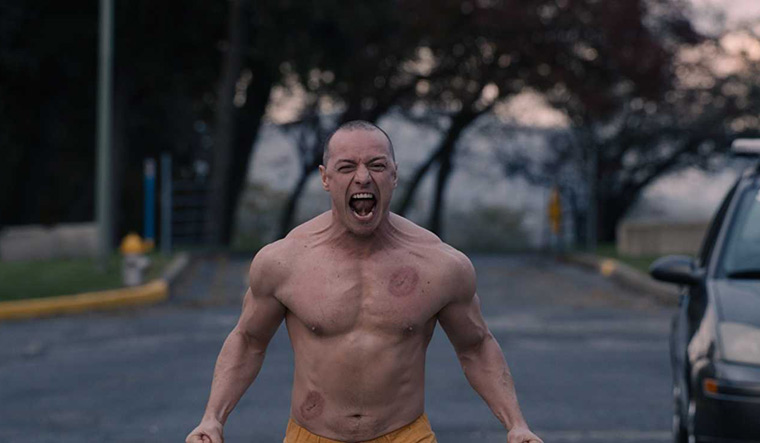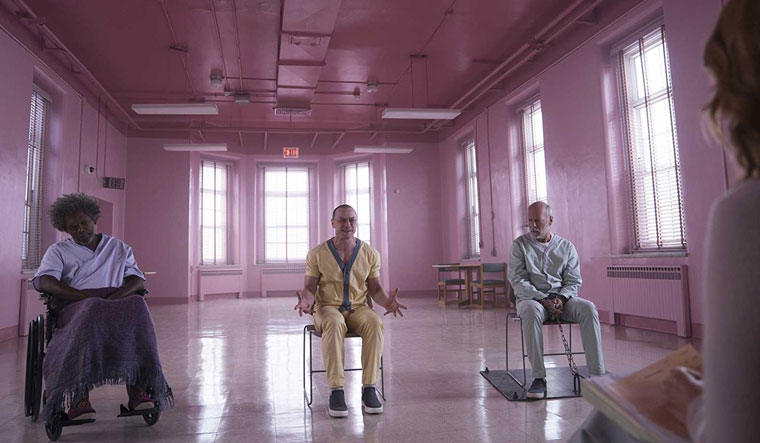There are two kinds of superhero universes—the one of DC and Marvel verse where you meet vigilantes with almost unfathomable powers and another created by M. Night Shyamalan where the heroes do not really get to save the day. While DC and Marvel heroes constantly remind you that they are destined for greater things, Shyamalan accords exceptional abilities to his characters in the Unbreakable series only to deprive them of these later to make them human—frail, mortal, and broken, like glass.
After the last-minute revelation in Split that David Dunn (Bruce Willis)—the security guard in Unbreakable who gains supernatural abilities after a train accident—has been fighting crime in the same universe that 'The Beast', Kevin Wendall Crumb and others of James McAvoy's 'The Horde' inhabit, Shyamalan takes us to an asylum in Glass. While trying to save a few girls from being 'sacrificed' to 'The Beast' or Kevin's 24th personality, David and Kevin are captured and brought to the psychiatric facility overseen by Dr Ellie Staple (Sarah Paulson). Her sole occupation seems to be convincing those with powers beyond measure that these abilities are merely grand delusions of deranged minds. In the facility is another one of their kind—Elijah Price aka Mr Glass (Samuel L. Jackson). A man with exceptional cognitive abilities, Glass, suffers from brittle bone disease and is sedated most of the time. The rest of the affair is fairly pedestrian until Shyamalan decides to pull a Kansas City Shuffle on us (oh yes, I know my Lucky Number Slevin, Bruce) to bring in an overarching narrative to tie Glass with its predecessors.
If you are one of those who got your hopes up when Shyamalan came along with 'The Horde' in Split, after a dull Visit and The Earth that was hardly a thing of beauty, be warned. Glass is here to remind you that the director may have to gather some creative steam if he wants us to repose our faith in him to deliver another Sixth Sense. Shyamalan manages to pique some interest with a few pointers on the banality and erudition of comic book heroes and their virtues. However, in his haste to borrow what was more than the necessary share from comic book heroes, he seems to have paid scant attention to coming up with a riveting storyline.

There have been earnest efforts, especially from McAvoy who, by now, has perfected the strut, gait and mannerisms of everyone in 'The Horde'. You also get to get to see more of 'The Beast' in some tender moments thanks to Casey (Anya Taylor-Joy). For Willis, however, this turns out to be another routine outing. Despite the depth his character was given in Unbreakable, he gets lesser screen time than he deserves in Glass.
Jackson does have his moments as the titular Mr Glass, but the character is so sketchy, despite the director's attempts to give us a glimpse into his broken soul, that you wish Shyamalan had not made the perfunctory attempt to make him more than the caricaturist superhero villains we are used to. Sarah Paulson's Dr Staple is no Frederick Chilton; she does not have much to do except deliver her lines with a straight face.
Cinematographer Mike Gioulakis, who worked with the director in Split, is forced to relay tad too much on CCTV footage which becomes tiresome after a while.
Performances, however sincere they are, cannot fill the chasm created by the absence of imagination when it comes to scripting. The only way you can forgive the transgressions of Shyamalan is if you are willing to concede to the premise that it is acceptable to dish out a half-baked plot as long as all the pieces from the flicks before fit in the end.
Film: Glass
Director: M. Night Shyamalan
Starring: James McAvoy, Bruce Willis, Sarah Paulson, Anya Taylor-Joy, and Samuel L. Jackson
Rating: 2/5



